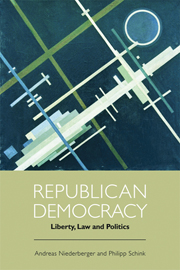Book contents
- Frontmatter
- Contents
- List of contributors
- Introduction
- 1 The Tension between Law and Politics in the Modern Republican Tradition
- 2 Impotence, Perspicuity and the Rule of Law: James Madison's Critique of Republican Legislation
- 3 Kant, Madison and the Problem of Transnational Order: Popular Sovereignty in Multilevel Systems
- 4 Republicanism and Democracy
- 5 Two Views of the City: Republicanism and Law
- 6 A Kantian Republican Conception of Justice as Nondomination
- 7 Two Republican Traditions
- 8 Freedom, Control and the State
- 9 Legal Modes and Democratic Citizens in Republican Theory
- 10 Rights, Republicanism and Democracy
- 11 Republicanism and Global Justice: A Sketch
- 12 Republicanism and Transnational Democracy
- Index
10 - Rights, Republicanism and Democracy
Published online by Cambridge University Press: 05 October 2013
- Frontmatter
- Contents
- List of contributors
- Introduction
- 1 The Tension between Law and Politics in the Modern Republican Tradition
- 2 Impotence, Perspicuity and the Rule of Law: James Madison's Critique of Republican Legislation
- 3 Kant, Madison and the Problem of Transnational Order: Popular Sovereignty in Multilevel Systems
- 4 Republicanism and Democracy
- 5 Two Views of the City: Republicanism and Law
- 6 A Kantian Republican Conception of Justice as Nondomination
- 7 Two Republican Traditions
- 8 Freedom, Control and the State
- 9 Legal Modes and Democratic Citizens in Republican Theory
- 10 Rights, Republicanism and Democracy
- 11 Republicanism and Global Justice: A Sketch
- 12 Republicanism and Transnational Democracy
- Index
Summary
Introduction
Rights are often seen as republicanism's Achilles' heel. Even certain friends of republican arguments fear its tendency to privilege democracy risks undermining respect for individual rights. As a result, they have suggested that we need to produce a marriage between liberalism and republicanism (for example, Dagger 1997, and in many respects Habermas 1996). Here I want to take a different tack and suggest that rights imply democracy rather than being a constraint upon it. By that I do not mean, as some have argued, that rights are implied by democracy – that all rights can be seen as somehow inherent components of a democratic process. Some, such as the right to vote, obviously are, but others, such as the right not to be tortured, have no intrinsic link to the democratic process (Jones 1994, 173–4). Rather, I wish to argue that rights claims can only be justified in democratic terms – as claims made under conditions of political equality. This understanding of rights is quite different to the deontological account standardly offered by liberal theories that hark back to the natural rights tradition. That account sits with a view of liberty as noninterference, which sees its main object as the restriction of law and government. By contrast, the democratic account of rights belongs to the republican view of freedom as nondomination. Here, rights reflect the common avowable interests of citizens and are both political in origin and in execution. On this account, the liberal view of a right against democracy appears both unjustifiable and incoherent.
- Type
- Chapter
- Information
- Republican DemocracyLiberty, Law and Politics, pp. 253 - 275Publisher: Edinburgh University PressPrint publication year: 2013



